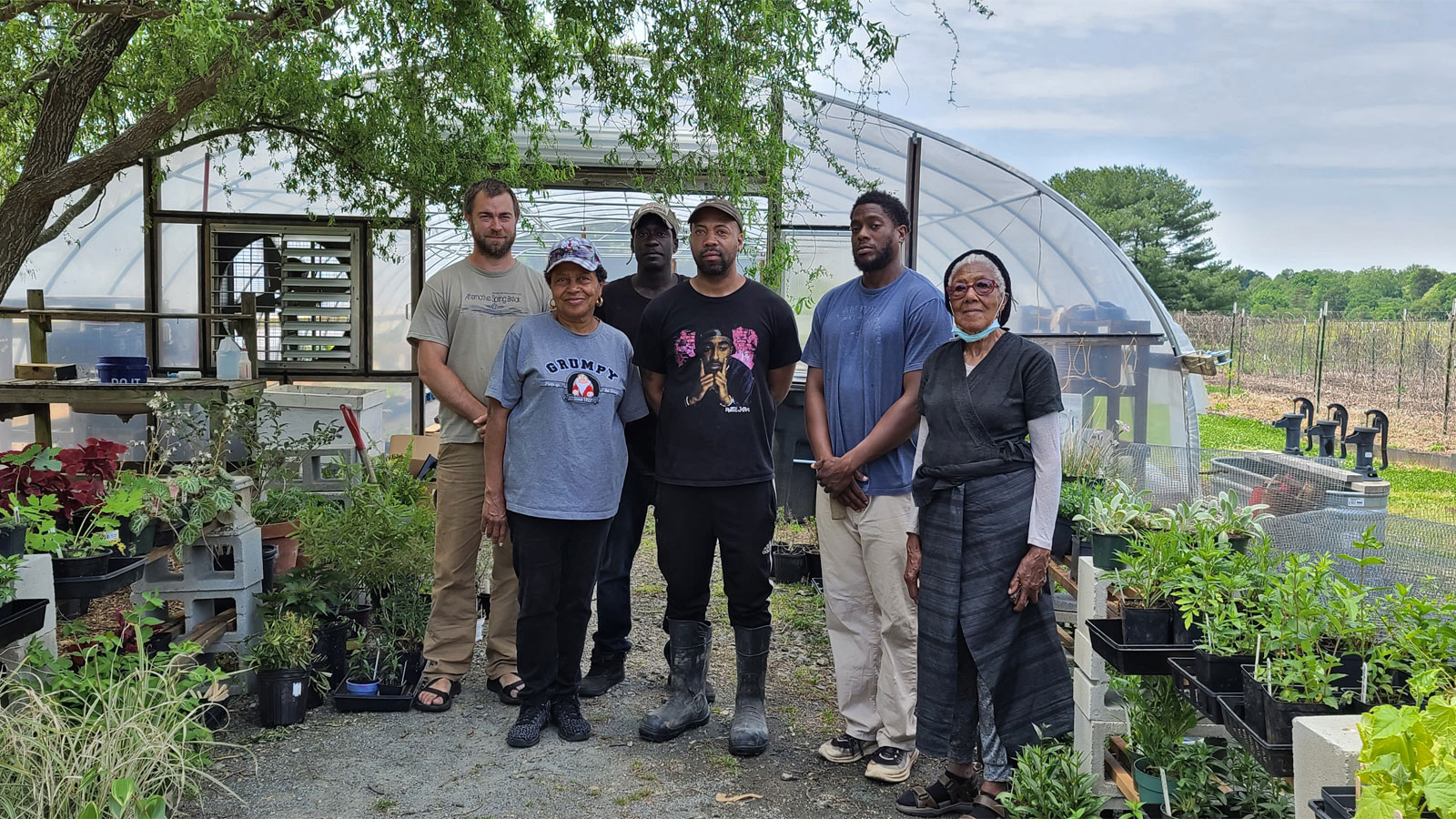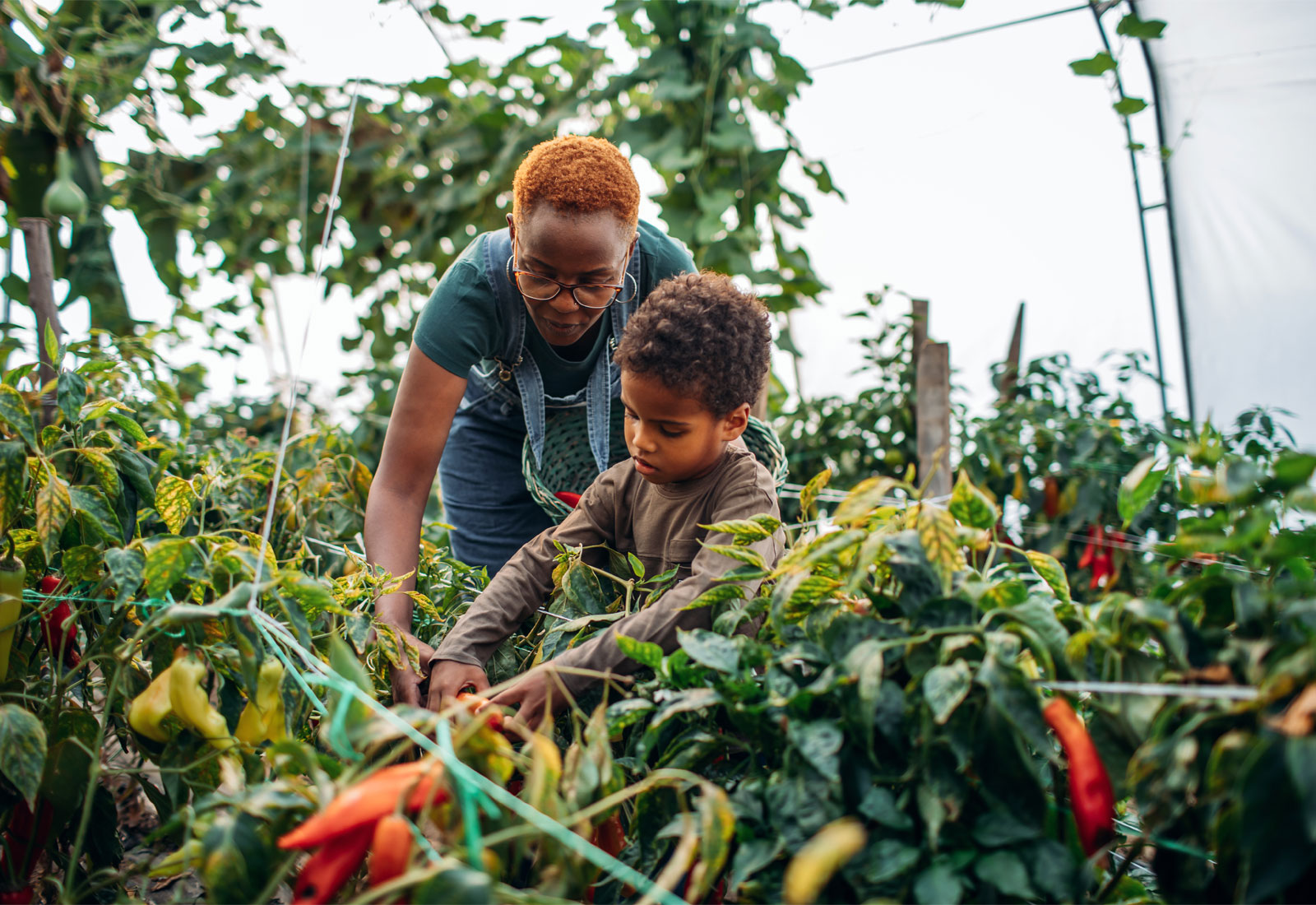It’s time to burst the bubble of the rural-urban divide: When it comes to competing against forces of gentrification and big agribusiness in the name of food equity, small farmers and urban farms have a lot in common. Here’s how two agricultural entrepreneurs are working toward common ground in the name of a healthier food supply.
In the working-class neighborhood of Pinehurst in Columbia, South Carolina, small-town attractions like parks, baseball fields, HBCU colleges, and parades are plentiful. So were grocery stores: Pinehurst was once home to a Piggly Wiggly, and a Sav-A-Lot, among others. Then in 2019, they suddenly all closed without warning.
April Jones, a Pinehurst resident originally from Akron, Ohio, was immediately inspired to take action. Jones credits her Ohio childhood — playing outside and harvesting the corn, tomatoes, and cherries from her grandparents’ farm — with giving her a holistic way of looking at and connecting with the Earth. Having read the 2017 book Fast Food Genocide by Joel Fuhrman, M.D., she was primed to think about how the ills in society are related to food: “If you have high rates of ADHD, check your food supply; if you have high crime, look at your [food] access points and how they correlate to food outcome[s],” Jones recalls.
“If my community doesn’t have access,” she says, “I wanted to create it.”
Food voids left by the loss of a local grocery store or a favorite roadside stand are difficult to fill. Farmers markets are part of our country’s lifeblood (there are 8,600 registered in the farmers market directory in the U.S. alone), and they are also vital to people living in food deserts, residential areas with few to no options for affordable, healthy foods and produce. Urban farms and rural roadside stands alike work hard to feed their communities, which is no small task for small farmers trying to compete with the seemingly unstoppable financial and political clout of big agribusiness. These food sources also serve an important secondary purpose: building community.
“Where we invest our money is where our hearts lie: It’s the soul of our country, community, and values system,” Jones says.
Data from the USDA’s department of agriculture marketing services show that 72 percent of U.S. counties reported having at least one farmers market in 2018, of which 45 percent accepted SNAP benefits. Neighborhood weekend markets that were able to remain open during the pandemic earned up to 79 percent less revenue than 2019, but still remained an integral part of neighborhoods like Pinehurst.
So in addition to recovering from the pandemic, the next critical transition for agriculture will be moving away from the industrial model that contributes significantly to climate change and threatens to destroy biodiversity, access to fresh food, and the lives of small farmers. Instead, we need a model that’s regenerative. In addition to the industry stalwarts such as Regeneration International and The Rodale Institute already working to do their part, action needs to happen at the community level, too.
Laying that groundwork has already begun for Eric Mathis, co-founder at the Institute for Regenerative Design and Innovation in Winston-Salem, North Carolina. He is a mellow, seasoned advocate on issues of food justice and access who also co-founded Renew Forsyth and the Piedmont Triad Farmers Network, a farming co-op he launched with five Black agropreneurs in June 2021.

Triad’s pilot market supplied food to Wake Forest Baptist Health’s food prescription program targeting Black and brown communities living in food deserts, as well as older populations with health disparities. The program aims to cultivate an entrepreneurial culture in which people will be willing to take risks to address the fact that one out of four children in North Carolina have insufficient food to meet their nutritional needs.
“Change moves at the speed of trust, and that’s an important part of the equation,” Mathis says.
Mathis is a staunch advocate of caring for the soil as a vehicle that will ultimately grow healthier crops. “At the baseline, a lot of our soils across the United States are dying,” Mathis explains. “In regenerative agriculture, the focus is really on taking care of the soil, which has all kinds of positive health benefits in terms of carbon sequestration from the atmosphere and climate change. But it also means increasing the nutrient density of food.”
Despite the tendency of agribusiness to hurt the environment that nourishes us, it is possible to put more muscle behind lasting institutional change. Since 2015, Dream Corps has been working to reward farmers for sustainable practices that will benefit their bottom lines and the health of their communities through cleaner water, air, and soil.
The Common Ground Campaign aims to bring people together across racial, social, and partisan lines to ensure a dignified future for all Americans, where jobs are plentiful and diversity is celebrated. By connecting disparate communities, uplifting voices of low-income families and people of color in the climate justice movement, and facilitating the sharing of inspiration and fresh ideas, the mythical urban-rural divide disappears, and grassroots groups can collaborate to find solutions to shared long-term problems.
“We all know from COVID-19 that we rise and fall together,” Jones says. “If the person at the store that is checking you out isn’t healthy, that affects you and your family’s health.” The solution is straightforward if not simple: “We need to invest in local communities.”
Dream Corps Green for All works at the intersection of the environmental, economic, and racial justice movements to advance solutions to poverty and pollution. We advocate for strong, resilient, and healthy neighborhoods through policy work and empathy based storytelling that ensures as the clean economy grows, it brings good jobs, better health, and opportunity to historically underserved communities. Learn more by visiting www.thedreamcorps.org or follow us on Twitter @GreenForAll.



